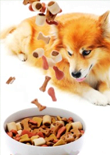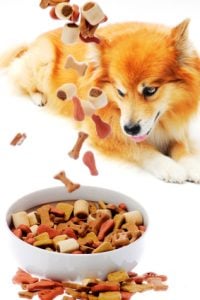
 Positive dog training is reward based and motivational. Training your dog in a positive manner will ensure that the two of you have a great relationship. Communication is increased immensely by reward based training, and reinforcement alongside reward is a really enjoyable way to teach your dog.
Positive dog training is reward based and motivational. Training your dog in a positive manner will ensure that the two of you have a great relationship. Communication is increased immensely by reward based training, and reinforcement alongside reward is a really enjoyable way to teach your dog.
Some dogs have little interest in training treats. The toy motivated dog will work nicely for a tennis ball or tug on a toy rope. Most dogs however will become quickly and easily motivated by a whiff of smelly cheese or liver sausage.
Dog training treats – motivation for reward
By introducing dog training treats into your training sessions you will see the difference in your dog immediately. He will become motivated and want to earn his reward. He will be alert to the potential result of his behavior and responses. Your dog will perform knowing that a reward is possible.
It is a similar response to the human pay increase.
Pet shops sell many varieties of dog training treats. Some catered to the dog’s great sense of smell. Scent of nice treats can be extremely motivational to your dog. Similar to a freshly cooked meal that will make our mouths water in anticipation. Some pet shop treats are already catered to dog training and use with the clicker.
It is not necessary to buy pet shop dog training treats. Leftover meat or cheap sandwich meat will easily get a dog switched on to learning for his reward. Small squares of cheese will present the same result and for hungrier dog’s part of their daily meal.
Working out the value of dog training treats
The best way to use treats as reward is to work out their value to your dog. Dogs, like human beings have preferences. I know a Yorkshire terrier that becomes completely manic for a lick of an empty cream tub; he prefers sweet rewards such as doggy chocolate drops. (This is a special blend of dog training treats since pure chocolate can be quite toxic to dogs.)
When you know your dog you will be able to tell if his interest is piqued by a particular treat. You can test him out with various small amounts and see which he likes the best, and then you can use the favorite for ultimate motivation.
Dog Training Treats – Optimization of effect
There is little point using the treat that your dog likes best to carry out easy tasks. Reward should reflect motivational level needed. By beginning with lowest level of reward you can gradually build to higher value dog training treats to build your dog’s motivation.
Here are some ideas for reward treats beginning with lower value treats and working to the elite and tastiest food reward.
Be careful with some human food. Any chocolate that is not specifically for dogs carries a toxic ingredient that is poisonous to the canine so steer well clear of this. Also be aware that much excess food in the form of dog training treats can cause weight gain.
Size of treats
To provide an effective motivational reward dog training treats should be tiny. A taste will leave your dog wanting more. Slivers of ham just big enough for your dog to taste will be sufficient reward. Think how the first tiny half square of tasty chocolate makes you feel, much better than you feel after devouring a large block of the same treat. It is paramount that you leave your dog wanting more throughout and at the end of a training session.
If dog training treats are too big your dog will lose learning momentum whilst the takes the time to eat them. He will also tire of them quicker therefore his motivation will wane sooner.
You can utilize the value of treats during training sessions. By having a stash of mixed treats ready your dog will never know if he is getting an average treat (piece of kibble) or something really special (square of liver) By alternating reward value you will maintain the motivation of your dog.
Session expired
Please log in again. The login page will open in a new tab. After logging in you can close it and return to this page.